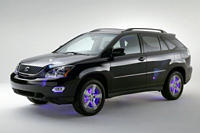Detroit Auto Show: Toyota Announces Revolutionary New Hybrid
Technology
DETROIT, Jan. 7, 2003; Toyota, the first company to sell a
mass-produced hybrid electric/gasoline car, today unveiled plans to offer a
revolutionary new hybrid powertrain in future vehicles. This hybrid system
will be offered in the Lexus RX 330 and will arrive in dealer showrooms in
about two years. The announcement was made at the North American
International Auto Show in Detroit and a sport utility hybrid vehicle (SU-HV)
show car was displayed.
This innovative electric/gasoline hybrid technology, called Hybrid Synergy
Drive, offers benefits far beyond today's hybrid vehicles. While the
strengths of current hybrid systems include low emissions and high fuel
economy, this new hybrid technology adds the benefit of outstanding
performance.
"The RX with Hybrid Synergy Drive has a V6 engine with the power and
torque of a V8 and delivers the fuel mileage of a compact car while producing
a fraction of the emissions of standard SUVs," said Toyota Motor Corporation
President Fujio Cho.
The Hybrid Synergy Drive operates with front and rear electric motors and
a front internal combustion engine. The system in the RX operates at nearly
double the voltage of the current Prius and generates more power with high
efficiency, dramatically cutting fuel consumption and emissions.
In addition, the front and rear electric drive provides the benefits of
all-wheel drive in a lighter and more compact package. And, the system is
highly modular so it is extremely flexible. Different size motors and engines
can be combined to favor either fuel economy or power ... or both. This means
the Hybrid Synergy Drive can be easily adapted to a broad range of vehicles.
"These major advances in our hybrid system and in the number of vehicles
carrying it will help us achieve our worldwide goal to put 300,000 hybrid
vehicles on the road annually by the middle of this decade," said Cho. "More
importantly, it will spread advanced, low-emission technology faster and
further around the world."



